Business & Management
Bank of Uganda holds career talk with students: Commits to Annual Monetary policy engagements
Published
10 months agoon
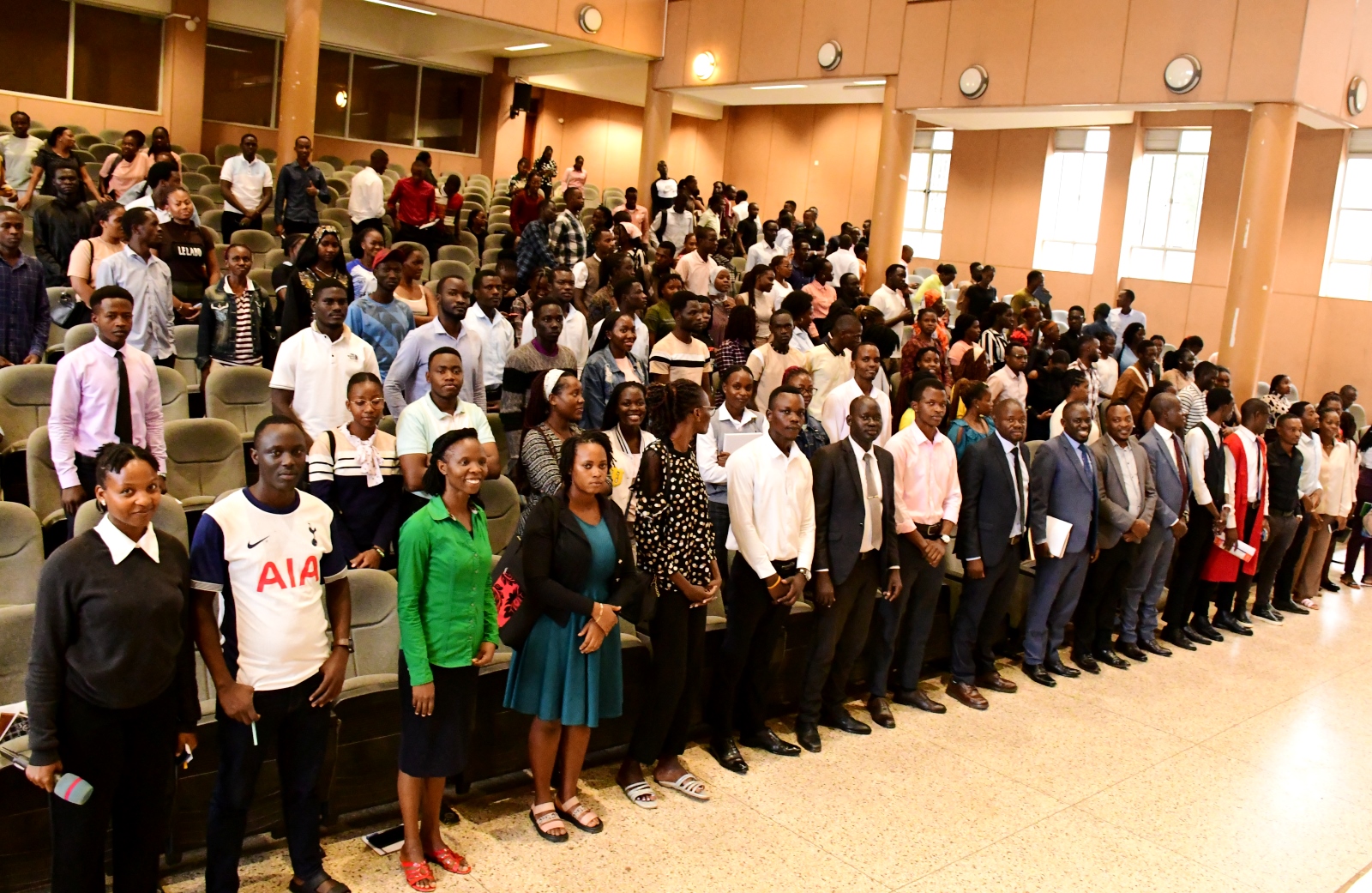
On 14th April 2025, the Bank of Uganda in partnership with the College of Business and Management Sciences (CoBAMS) hosted a career talk targeting students studying economics at Makerere University.
The Bank of Uganda is one of the leading employers of students from Makerere University. It is therefore a key strategic partner of Makerere University.
In line with the theme of the career talk, ‘Beyond the Books-Positioning Economics Students for National and Global Relevance,’ the various Speakers shared their student experiences while at the University up to graduation, and their real-life experiences as they transitioned into the world of work. This approach enabled the Speakers to manage the expectations of the students, who in turn, listened attentively to the Speakers, actively participated in the plenary, responded to questions from the Speakers, asked questions after each presentation, and requested for more engagements, mentorship and networking sessions.
From the presentations and discussion, the world of work focused on fields such as economics, business, finance, accounting, entrepreneurship, farming, the academia, the teaching profession, and any other field that presented the Speakers with an opportunity to serve their respective communities.
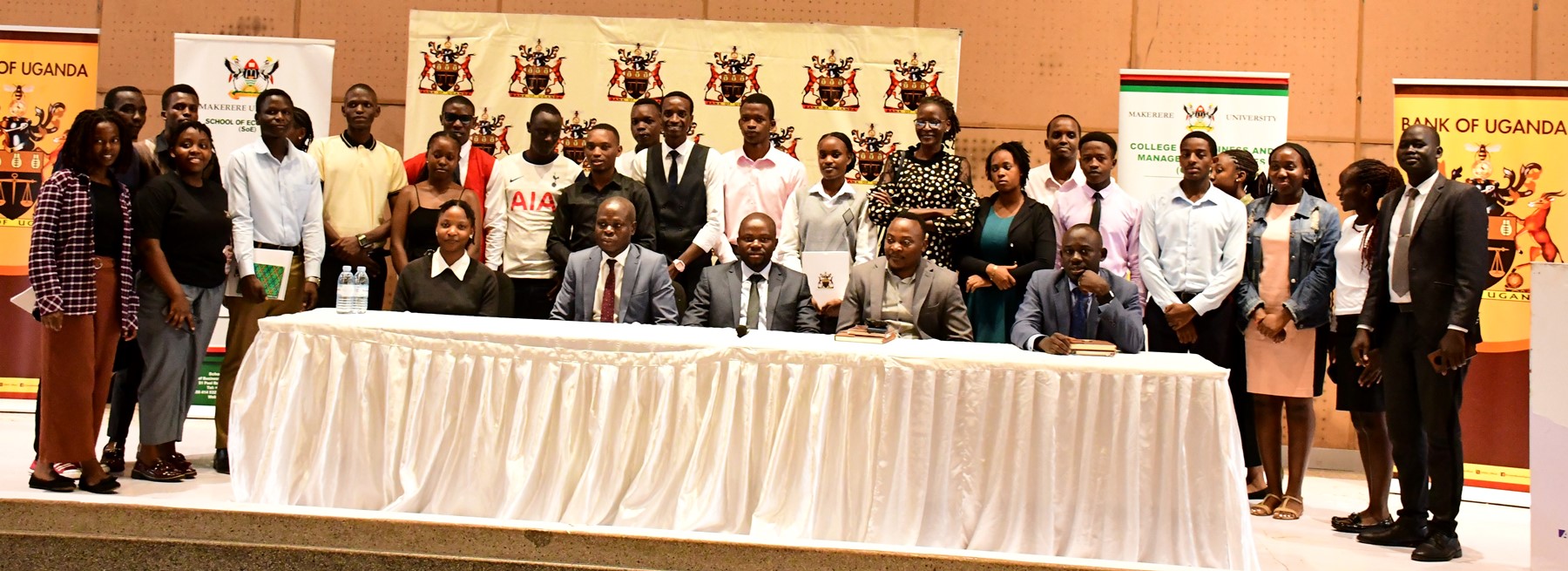
Featuring Mr. Jonah Waiswa, the Head of Stakeholder Engagement at the Bank of Uganda, the career talk, presented a scenario of, “I have walked this journey. I have been successful. When you listen to my story, you could get some tips and valuable knowledge to guide you as a student who is scheduled to transition into the world of work.”
During the career talk, the students also listened to speeches loaded with words of wisdom and inspiration from the Principal of the College of Business and Management Sciences-Prof. Edward Bbaale, the Dean of the School of Economics- Dr. Ibrahim Mike Okumu, and Lecturers from the School of Economics-Dr. Peter Babyenda and Mr. Fred Kasalirwe.
Welcoming the team from Bank of Uganda, Prof. Edward Bbaale pointed out that their presence signified a continued commitment to nurturing the next generation of economists- who are academically sound and industry-ready.
“The theme for the Career Talk was relevant and timely. As the College prepares students to thrive in a highly competitive and dynamic global economy, it is important that they are exposed to practical experiences and real world insights,” he stated.
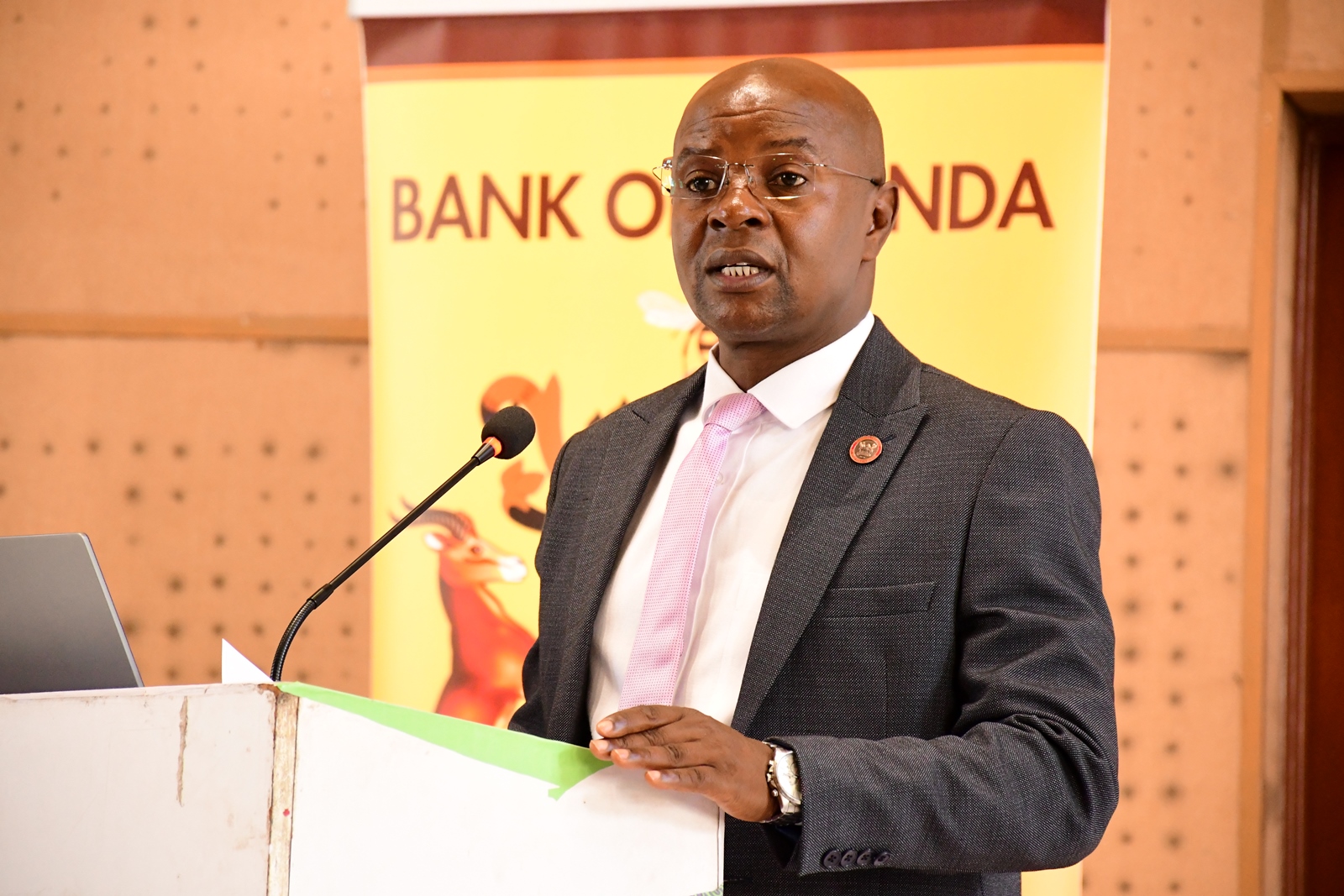
According to the Principal, the collaboration between Makerere University and the Bank of Uganda is long-standing and deeply valued. “In the past years, the School of Economics has benefited greatly from this relationship-through teaching of specialized courses such as Monetary Economics and Banking by experts from the Central Bank. Many of our alumni fondly recall these interactions that bridged theory with practice,” he remarked.
To the students, he said, “I urge you to listen keenly, ask questions and make the most of today’s interaction.”
Challenging the students to always utilize opportunities when they arise, the Dean of the School of Economics, Dr. Mike Ibrahim Okumu reminded students that economics is not just about understanding the world, but about changing it.
Dr. Okumu reported that the School of Economics’ esteemed collaboration with the Central Bank has been instrumental in developing the curriculum. “This year, we are excited to launch a Master of Science in Economic and Investment Modelling, admitting a select group of ten students. This programme signifies our commitment to producing graduates who are deeply engaged in practical applications of economics,” he stated.
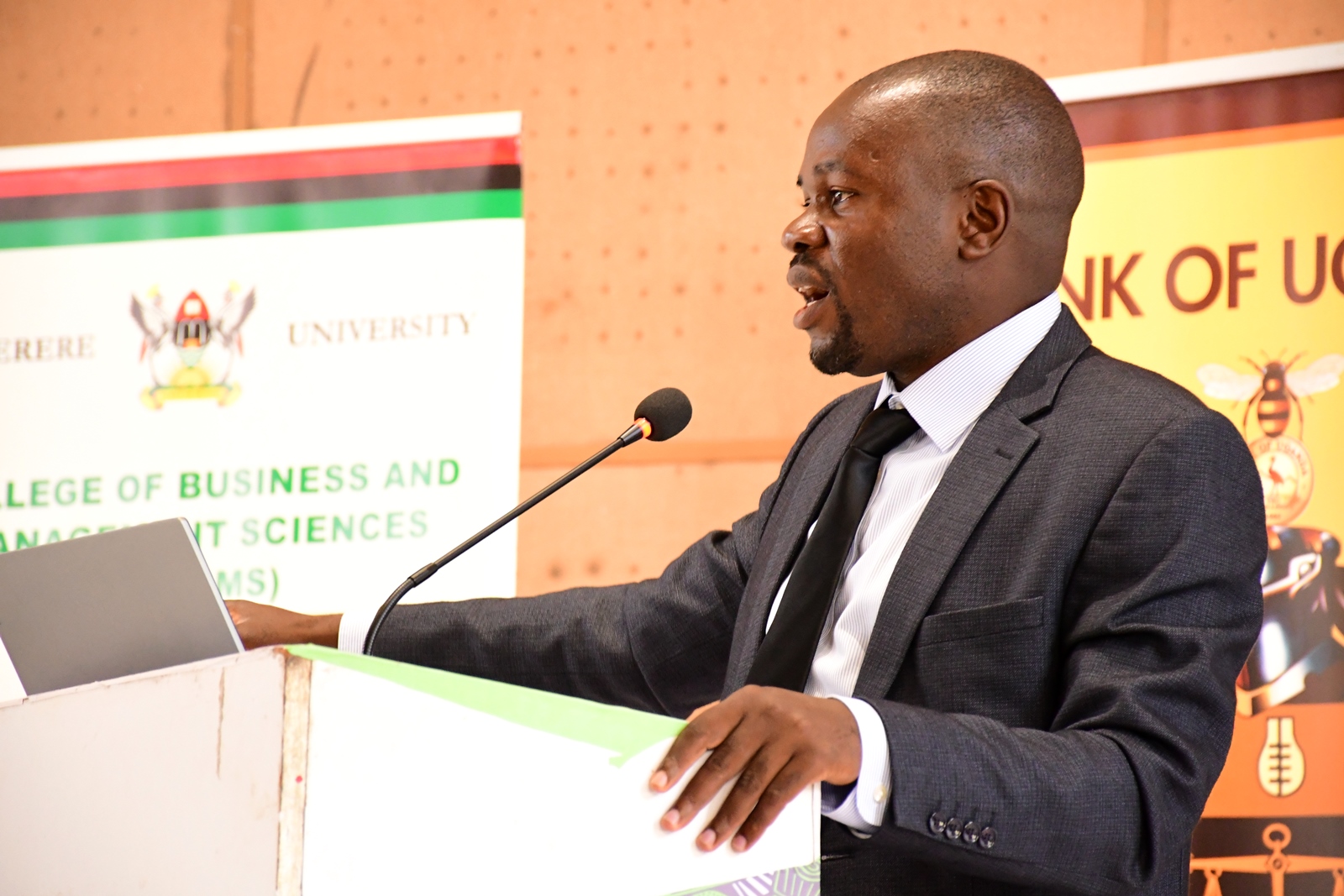
Building on the goodwill between Makerere University and the Bank of Uganda, Mr. Waiswa was pleased to address the students-who are the prospective employees of the Central Bank as well as future economists.
Impressed by the level of attendance, the keynote Speaker-Mr. Jonah Waiswa commended the College Principal, the Dean and Staff in the School of Economics and the Makerere University Economics Students Society for the excellent mobilization.
He was delighted to address students studying economics at the University because he was once like them. “I was once an undergraduate student like you. I focused on my studies and performed well. I took advantage of the opportunities that came my way. I have spent a number of years working with the central bank,” shared Mr. Waiswa, an alumnus of Makerere University who on completion of his studies was privileged to join the world of work.
In his presentation, Mr. Waiswa highlighted the Bank of Uganda’s mission to foster price stability and a sound financial system, and its vision of being a centre of excellence in upholding macroeconomic stability. The Bank of Uganda is mandated under article 162(1) of the constitution to promote and maintain the stability of the value of the of the currency of Uganda; to regulate the currency system in the interest of the economic progress of Uganda; and to encourage and promote economic development and efficient utilization of resources.
He defined concepts such as monetary policy, macro-economic management policies, inflation and stability of the economy, which are taught in the classroom at Makerere University, and applicable at the Central Bank. He stressed that the cardinal principle of the Bank of Uganda is to control inflation. He made specific reference to some of the values of Bank of Uganda namely Integrity, Accountability, Transparency, professionalism, inclusivity and innovation. He informed students that these values are central to the day to day lives of students who wish to excel in life and at the world of work.
He requested the students to always log on to the central bank website to have a broader understanding of its roles, functions, opportunities that are available to students as well as careers at Bank of Uganda.
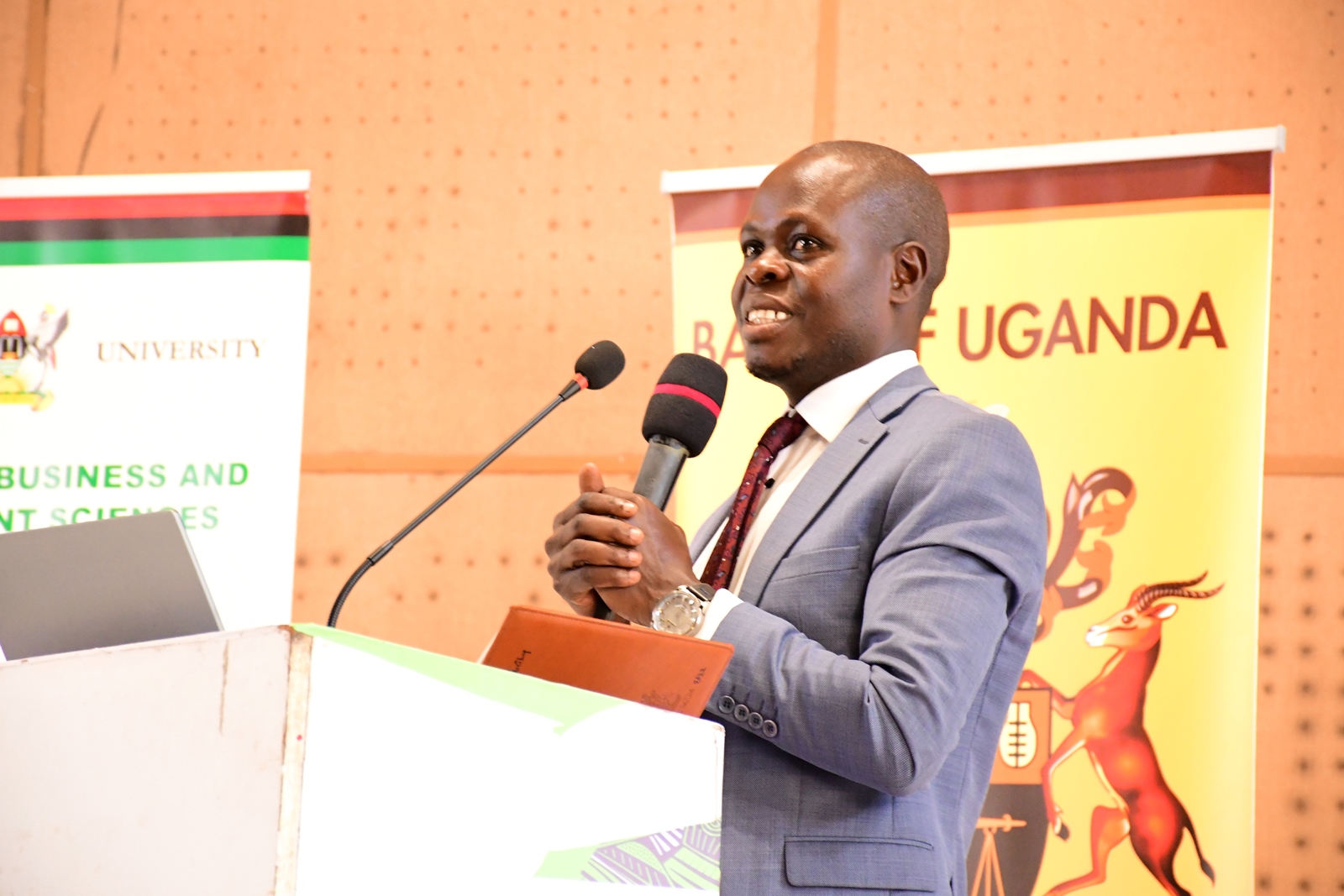
Mr. Waiswa highlighted that education is the ladder to socio-economic transformation. He called upon the economics students who have been presented with the golden opportunity to access education up to the level of the university, to reflect on the question. “How do I leverage my education to make myself better?”
With reference to the theme of the Career talk, Mr. Waiswa noted that the starting point is for each student to understand and appreciate the need to concentrate on his or her studies and excel academically. According to him, academic excellence presents an individual with a chance to tap into other opportunities.
In addition to academic excellence, students should prepare to transition into the world of work, which could be, in the form of being employed, or self-employed or an entrepreneur. Mr. Waiswa guided that whatever field in the world of work, an individual pursues, understanding aspects such as self-discipline, time-management, acquisition of additional skills relevant to your work, integrity, accountability, and among others are paramount.
He rallied students to value internship or industrial training, voluntary service, networking and mentorship. He advised them to always navigate the websites of different institutions/companies to understand their roles, the caliber of employees that they require, and to search for opportunities.
Sharing his journey of humble beginnings, completing his undergraduate degree and enrolling into the world of work based on hard-work and merit, Mr. Waiswa informed the students that it is possible to commit to breaking the chains and succeed in life. Emphasizing the importance of education, Mr. Waiswa reminded the students that the fact that they have been able to study at Makerere University, they should harness the power of education to transform their lives and the communities that they come from.
“My journey has been from humble beginnings to a position where I can influence change-it’s a testament to the power of education. Inspiration is critical, and I hope you take something valuable from today,” said Mr. Waiswa.
“For those of you in the second and third year of study, your studies in monetary economics and macroeconomics are foundational. They lead us to understand the practical implications of what we learn in the classroom. However, it’s imperative that we also focus on life experiences and the journey to transformation,” he added.
Education is the ladder that connects us, regardless of where we may find ourselves in Uganda. It is this a common ground that can propel us forward. Leveraging your education to improve your circumstances is key, but it requires a passion and a drive to succeed.
Mr. Waiswa advised the students that the world of work requires employees who read the signs and take off time to acquire additional skills in a particular field. These include: Enrolling to study professional courses, acquisition of ICT skills, adapting to trends such as AI, as well as attaining a Master’s degree in the relevant discipline.
Without mentioning the names of the affected individuals (as confidentiality is concerned), Mr. Waiswa shared a lived experience where he painful witnessed some employees who had served with dedication at a particular organisation missing out at the time for promotion to the managerial level because they lacked a Masters’ degree. He noted that such individuals did not take advantage of availability of funds provided by the same organization to its employees to enroll for further studies.
Reflecting on the world of work, he asked the students, “Who are you out of class? He challenged them to visualize their technical competence (qualification) which includes the technological expertise, productive competence, communication competence (interpersonal relations) and personal development.
On the fundamental aspect of personal growth and development, he used an illustration of the effort pyramid to explain the concepts of growth and development, Job/work, and academics.
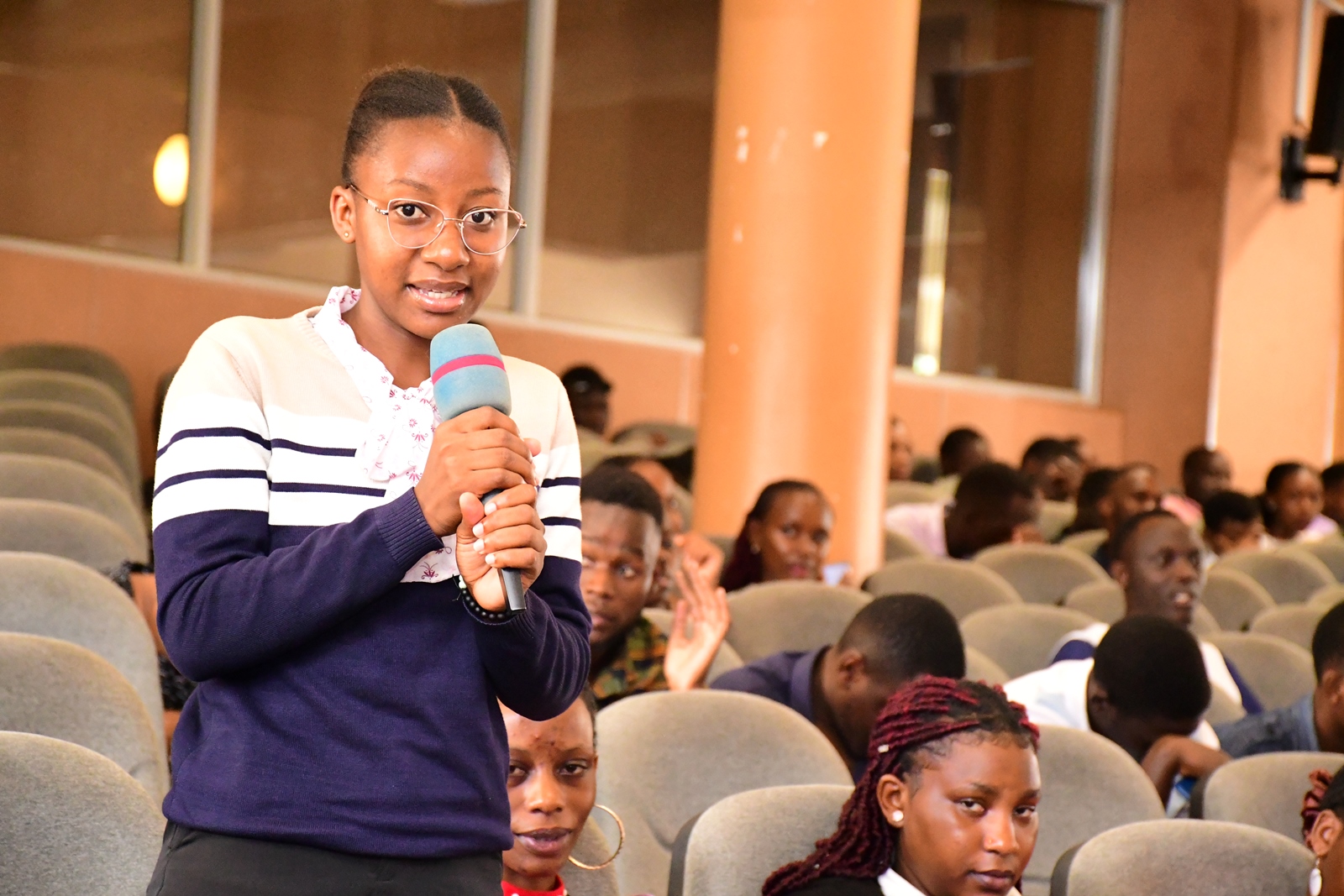
He emphasized the need for diversification by investing in more than one asset class. He mentioned stocks, bonds, real estate and cash as some of the asset allocations that could be considered.
Tackling the area of investing, Mr. Waiswa revealed that fundamental wealth creation is about managing risk. “During investment decisions, we are presented with profits and losses, but the most important factor is managing risk,” he guided.
Underscoring the value of being accountable, Mr. Waiswa explained that when an individual secures a job, it is imperative that he or she works for the number of hours agreed upon, and delivers to the best of his or her ability. “After you have accorded your employer the hours agreed upon, it is important to use the rest of the hours or weekends to take on activities that advance your personal growth, networks and additional sources of income,” he said. In this regard, he informed the students, that after his working hours at the Bank of Uganda, he ventures into real-estate, farming, entrepreneurship and building valuable networks.
On the issue of prioritizing work and valuing networks, he said: “Despite my busy weekends dedicated to farming, I prioritized being here today because I am committed to my personal growth and that of my future generations. Remember that what you expect of life is often what you have to work tirelessly to achieve.”
He believes that after graduation and getting into the world of work, one should be able to marry or get married, produce children and balance work with family when he or she is still energetic. He encouraged the would be husbands to trust their partners, to be specific-by involving their wives in businesses and decision making processes.
Wrapping up, Mr. Waiswa disclosed that officials from the Bank of Uganda will be scheduled to come to Makerere University every year to discuss monetary policy and career prospects at the Bank. “Effective July 2025, we will implement a deliberate plan to come and engage with students at the College of Business and Management Sciences,” he said.
On behalf of the students, Mr. Swaibuh Damulira, the President of the Makerere University Economics Students Society applauded the Bank of Uganda team for creating time to enlighten students about the world of work. He testified that the career talk had enabled him to learn new things and very important ideas about the life style cycle. He called for continuity of career guidance initiatives for the benefit of the students.
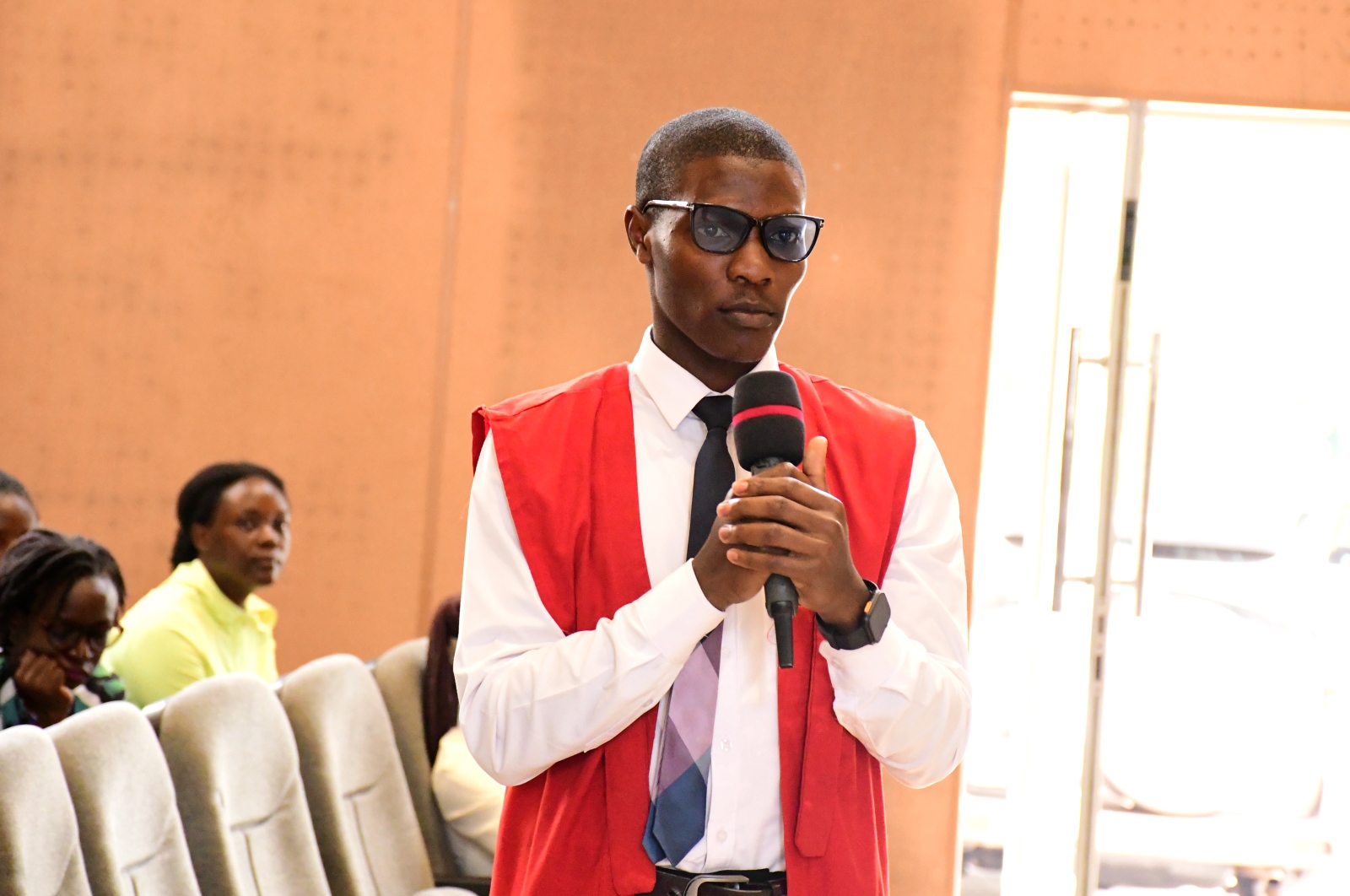
On behalf of the Organising Committee, Dr. Peter Babyenda thanked Mr. Jonah Waiswa for dedicating time to share his rich and wide real life experiences with students. “As economists, it is vital to understand current challenges and devise solutions. Networking is essential for it presents us with the ability to collaborate effectively,” he explained.
“Together, we aim to link the University with policy makers, reducing the distance between the academia and the real world. I thank Fred Kasalirwe and the Class coordinators for their unwavering support in organizing this career talk,” he remarked.
Dr. Babyenda underscored the importance of students’ participation, when he stated, “Remember, the university experience is incomplete without you, our students, who are our greatest resource. Let us continue fostering these important connections.”
The career talk climaxed with a specialized session scheduled for student leaders to visit the Central Bank next month for an in-depth discussion.
You may like
-


Mak News Magazine: February 2026
-


Celebrating Academic Excellence: CoBAMS Presents 975 Graduands at Mak 76th Graduation Ceremony
-


Mak 76th Graduation Ceremony: CoNAS Presents 16 PhDs & Best Performing Male Student in the Sciences
-


Medical graduates urged to uphold Ethical values
-


CAES Presents Overall Best Performing Student in the Sciences & a Record 28 PhDs at the 76th Graduation Ceremony
-


Over 9,200 to graduate at Makerere University’s 76th Graduation
Business & Management
Celebrating Academic Excellence: CoBAMS Presents 975 Graduands at Mak 76th Graduation Ceremony
Published
1 day agoon
February 26, 2026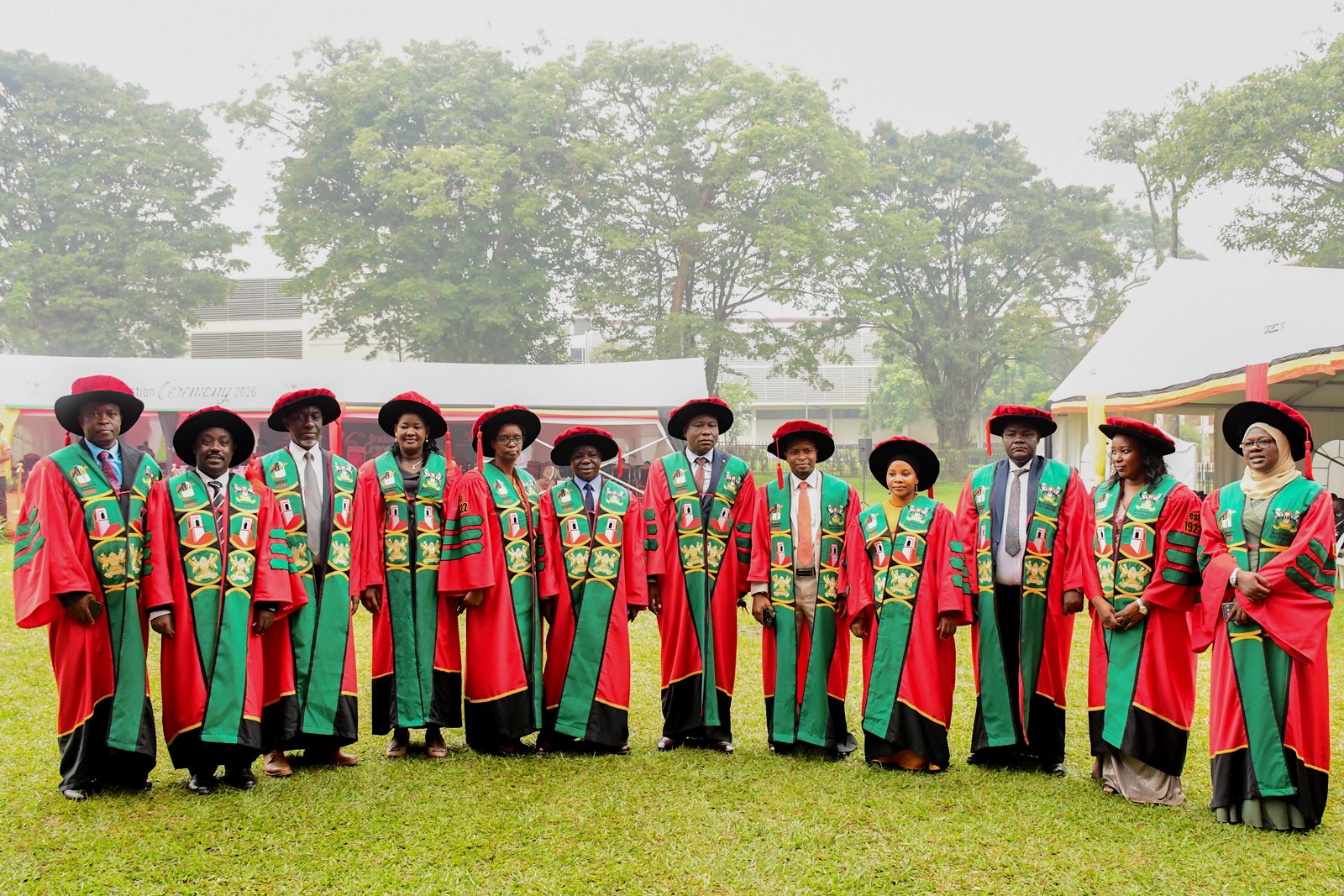
26th February 2026– The third day of Makerere University’s 76th Graduation Ceremony, held on 26th February 2026, underscored the University’s central role in shaping economic thought, business leadership, and public policy in Uganda and beyond. On this day, the College of Business and Management Sciences (CoBAMS) together with Makerere University Business School (MUBS) presented their graduands for the conferment of degrees and award of diplomas.
CoBAMS Graduation Statistics
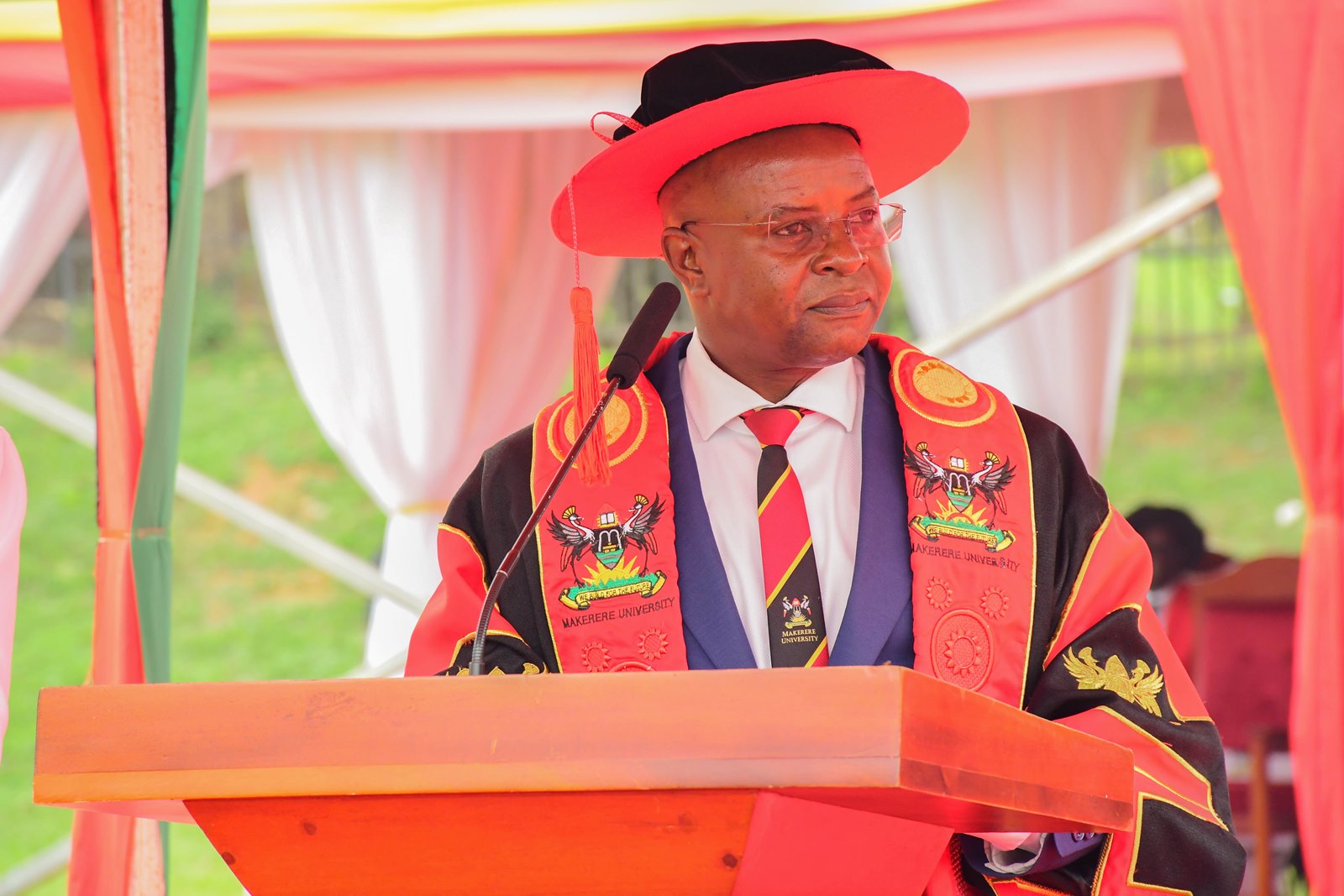
Across the University, a total of 9,295 graduands will be presented during the 76th graduation ceremony (24th to 27th February 2026). The College of Business and Management Sciences presented 975 graduands, comprising 14 Doctor of Philosophy (PhD) degrees, 334 Master’s degrees, 2 Postgraduate Diplomas, and 625 Bachelor’s degrees. This robust academic profile reflects the College’s sustained investment in advanced research, graduate training, and industry-relevant programmes designed to equip graduates with analytical competence, ethical grounding, and leadership capacity required to contribute meaningfully to economic transformation, institutional development, and enterprise growth at national, regional, and global levels.
Prof. Nawangwe emphasized that CoBAMS remains a key pillar in advancing the University’s research agenda. Through strategic partnerships with government ministries, the business community, and the private sector, the College has produced over 60 high-quality research outputs under the CoBAMS Working Paper Series, many of which have been published in internationally recognized peer-reviewed journals. These outputs he said are aligned with the UN Sustainable Development Goals (SDGs), Uganda’s 10-fold National Economic Growth Strategy, and the University’s Strategic Plan, reinforcing CoBAMS’ role in driving evidence-based development.
The Vice Chancellor commended the College for its five dynamic research centres—Entrepreneurship and Innovation; Statistics and Demography; Public Investment Management; the Environment for Development Initiative; and the Centre of Excellence for Africa Climate-Sensitive Macroeconomic Modelling—which collectively form the backbone of the College’s research enterprise. Through these centres, he noted CoBAMS continues to advance high-level scholarship, foster interdisciplinary collaboration, and deepen policy engagement, firmly positioning itself at the forefront of national and regional economic discourse.
In his message to the graduands, Prof. Nawangwe tasked them to become job creators, who are ready to turn challenges into opportunities. He encouraged them to remain proud ambassadors of Makerere University, upholding integrity and excellence, and to utilize their knowledge to transform communities and nations.
“You are all graduating with disciplines that are needed by society. We have equipped you with the knowledge and skills that will make you employable or create your own businesses and employ others. Do not despair. If you cannot find employment, reflect on the immense opportunities around you and raise to the occasion as an entrepreneur,” Prof. Nawangwe stated.
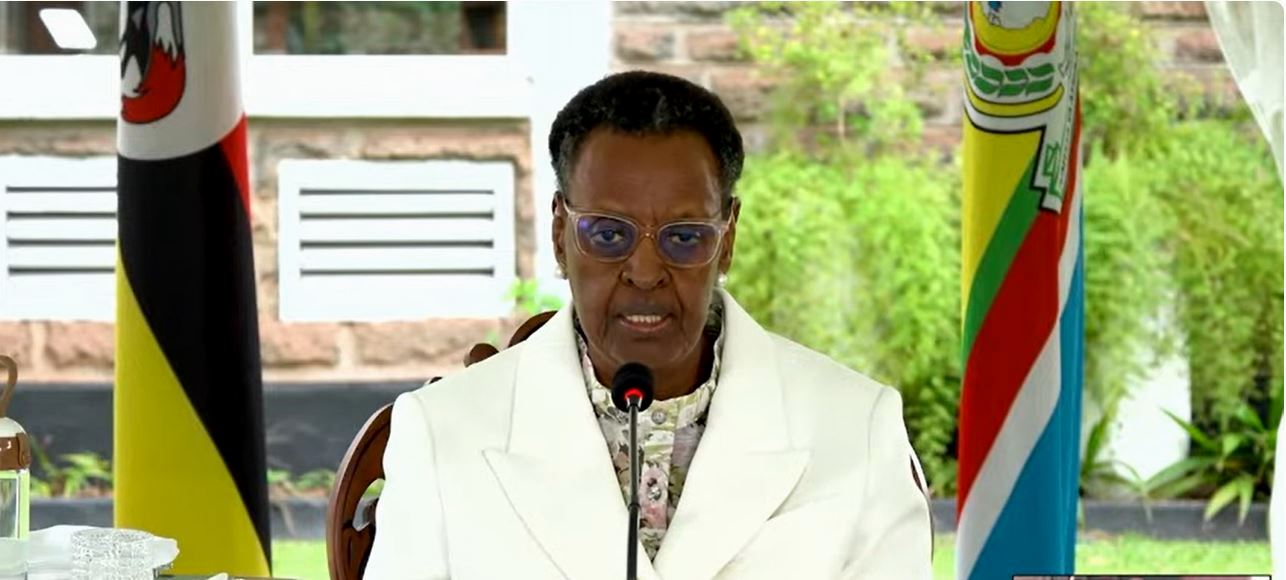
Addressing the congregation, the Guest of Honour, Hon. Janet Kataaha Museveni, First Lady and Minister of Education and Sports commended Makerere University for its pivotal role in transforming lives and shaping Uganda’s future. She congratulated the graduands upon reaching a significant academic milestone and reflected on the broader purpose of higher education in developing both knowledge and character.
She highlighted the success of the Emerging Leaders Programme, launched at Makerere University as a deliberate initiative to cultivate a generation of leaders grounded in values, integrity, and service. Founded on the conviction that higher education must shape both mind and character, the programme equips young people to navigate real-world challenges. She noted that 20 graduates from the inaugural cohort of the Emerging Leaders Programme were being celebrated at the 76th graduation.
“We recognised that our young people face real challenges such as moral decay, violence, addiction, exploitation and sometimes a loss of purpose and direction. The Emerging Leaders Programme was a deliberate commitment to raise a generation of leaders grounded in values, integrity and service to others. Today, 20 graduates represent the early visible fruit of that vision. They have deliberately chosen to build their lives on a foundation of strong moral values and servant leadership,” the Minister said.
The Minister urged graduands to view their achievements not as an end, but as a commissioning. She called upon them to lead with courage, humility, and responsibility, emphasizing that the world needs graduates who embody not just skills and knowledge, but character, integrity, and service. She reminded graduates that as they step into society, they carry the promise of a new Uganda, one where talent, ambition, and knowledge are matched by integrity, purpose, and service,” she exhorted, celebrating the role of higher education in nurturing both excellence and character.
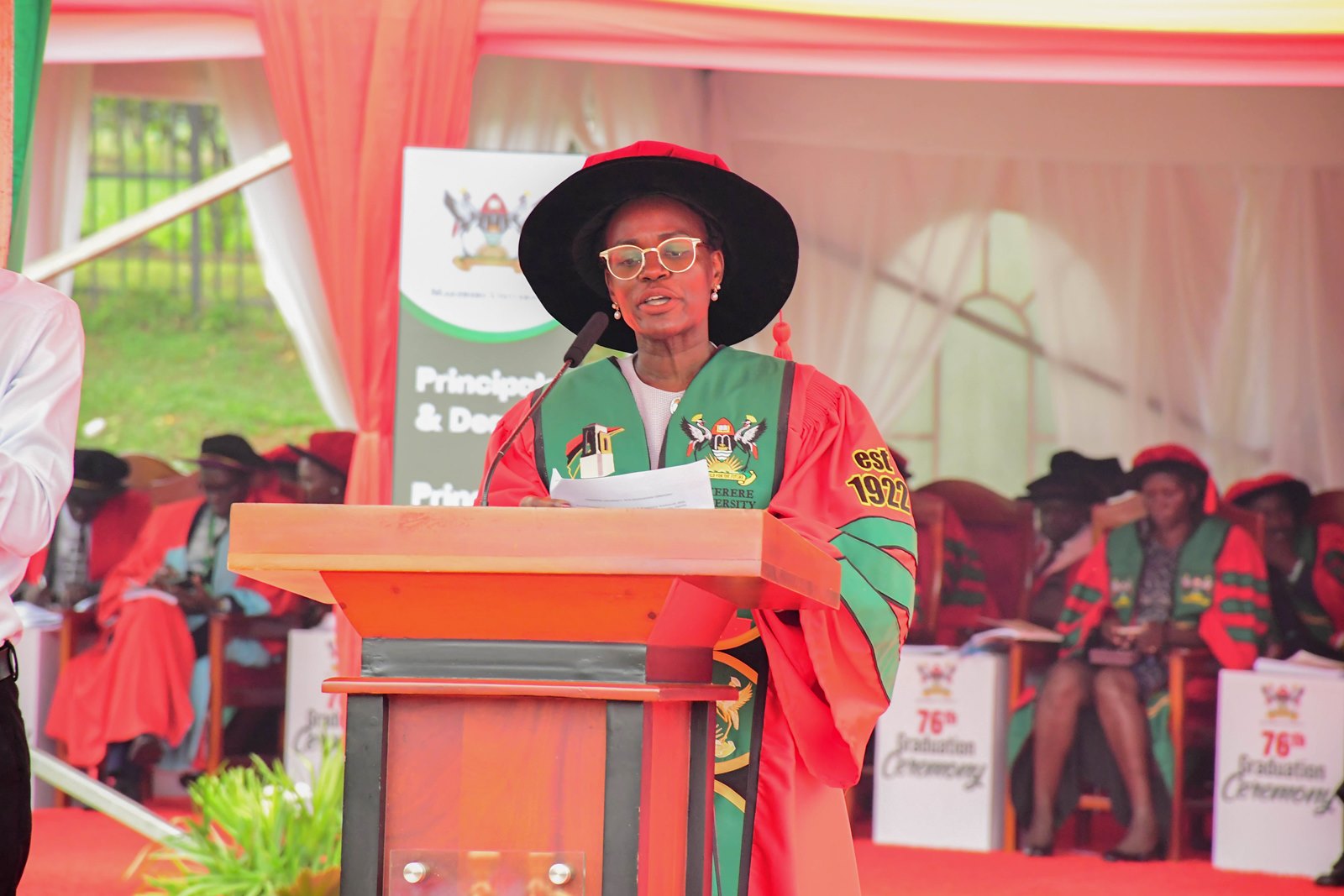
Delivering the commencement address, Dr. Patricia Ojangole, Managing Director of Uganda Development Bank and a proud Makerere University alumnus, lauded the University for equipping graduates with a strong intellectual foundation and the confidence to navigate the complexities of the modern world. She recognized the sacrifices of parents, guardians, and relatives, noting that behind every graduand lies a story of perseverance, encouragement, and unwavering support.
Dr. Ojangole urged the graduands to look beyond traditional employment, highlighting the vast opportunities for entrepreneurship and innovation in today’s digitally connected and globally integrated Uganda. She reminded them that the skills, exposure, and knowledge they possess, position them to create solutions, build enterprises, and drive economic and social transformation.
She emphasized lifelong learning, adaptability, and the cultivation of emotional intelligence and leadership as essential tools for sustained success, noting that the most effective leaders inspire and empower others. Above all, she urged the graduates to guard their integrity, develop strong networks, and remain resilient in the face of setbacks, framing every challenge as an opportunity to strengthen character.
“Learning does not end with this degree. The world of work is constantly evolving—technology advances, markets shift, and customer needs change. Those who stop learning quickly fall behind. Graduates must develop skills in artificial intelligence, data literacy, analytical thinking, forecasting, and strategic planning, while also cultivating emotional intelligence and leadership. These abilities are essential in the 21st-century workplace, where people follow leaders who inspire. Lifelong learning, adaptability, curiosity, and a willingness to embrace change are no longer optional—they are the new currency of corporate and business success,” she submitted.
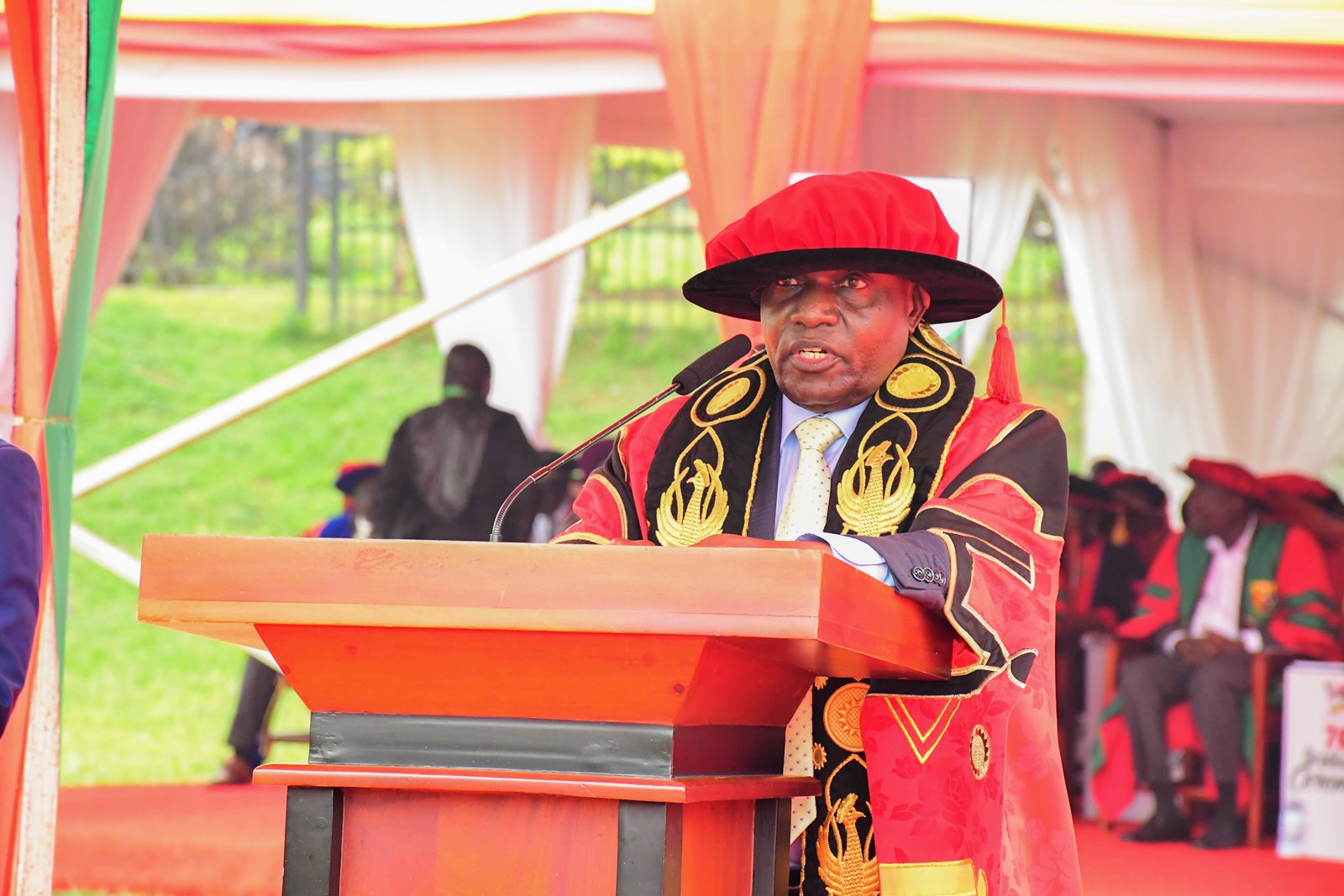
The Makerere University Chancellor, Dr. Crispus Kiyonga urged graduates to view their time at Makerere not only as an academic journey, but as an opportunity to engage with the world around them. He encouraged them to identify opportunities within their communities and the nation at large, highlighting that while some may secure government or private sector jobs, others will need to create their own paths through entrepreneurship.
“Beyond pursuing your courses, seize the opportunities at the university to broaden your knowledge of the world, your country, and the communities in which you live. Be attentive to the opportunities around you—those you can leverage to engage in meaningful and viable activities that bring prosperity,” the Chancellor advised.
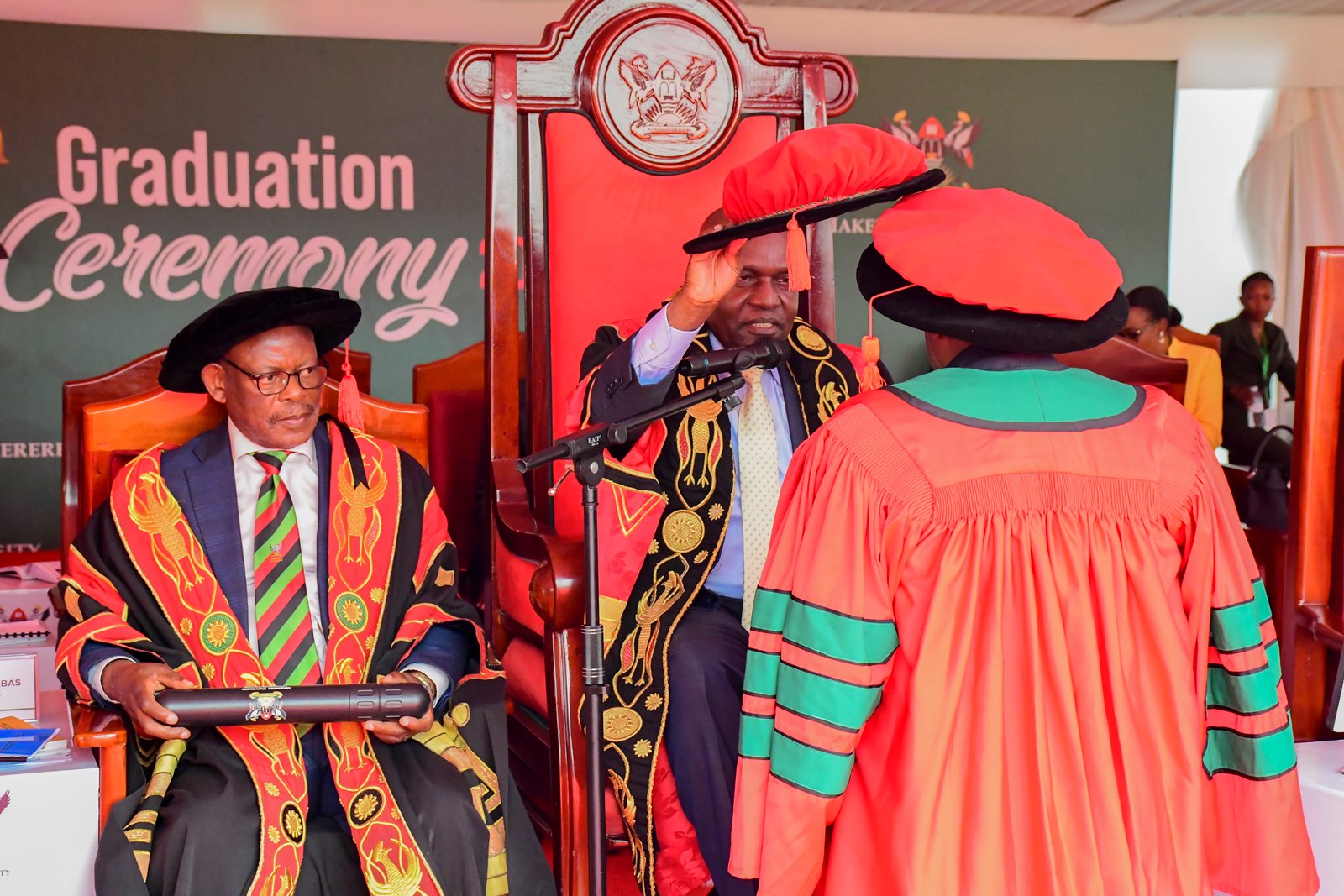
A key highlight of the day was the conferment of the Doctor of Letters (Honoris Causa), of Makerere University upon Dr. Japheth Buleetwa Katto, recognizing him as an Honorary Scholar of Makerere University. A distinguished professional with remarkable achievements, Dr. Katto has made significant contributions to Uganda, the East African region, and beyond, particularly in advancing the accountancy discipline and strengthening the capital markets industry. His work has played a transformative role in Uganda’s social and economic development while also influencing the accountancy profession on a global scale.
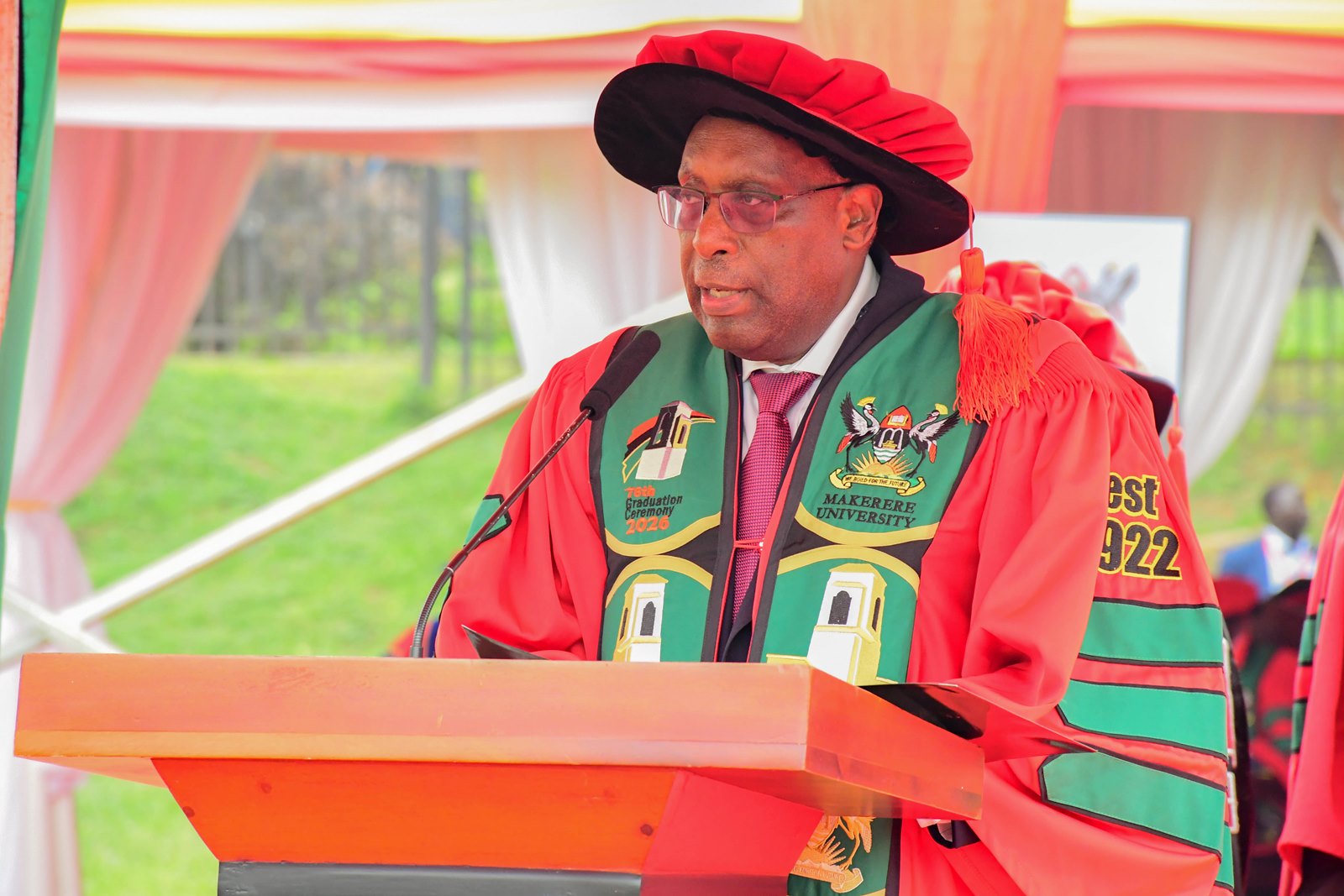
Accepting the Honorary Doctorate Doctorate, Mr. Japheth Buleetwa Katto expressed deep gratitude to Makerere University and those who supported his journey. Reflecting on fifty years in corporate governance and finance, he emphasized a key lesson: integrity, diligence, and ethical leadership are always noticed, and the rewards of sowing excellence will inevitably follow, even if it takes decades.
“This recognition comes as a surprise and brings with it an important lesson, I wish to share with everyone here: people are always watching. They notice when you choose integrity over shortcuts, when you champion good governance even when it is unpopular. They see not only the good, but also the bad and the ugly. We must never forget the eternal law of the harvest: we reap what we sow. If you sow excellence, diligence, and ethics, the harvest—though it may take decades—will always find you,” Dr. Katto said.
Addressing the graduands, Mr. Japheth Buleetwa Katto urged them to embrace the unexpected, recognize that integrity is their greatest strength, and harness the power of networking. He reflected on his own journey, crediting teachers, mentors, colleagues, and family for their support, and encouraged the new graduates to always strive to make a positive impact in everything they do.
Business & Management
Parliament, MoFPD and Makerere Launch Five-Day Training on Integrated Macroeconomic Modelling to Strengthen Fiscal Oversight
Published
2 days agoon
February 25, 2026By
Mak Editor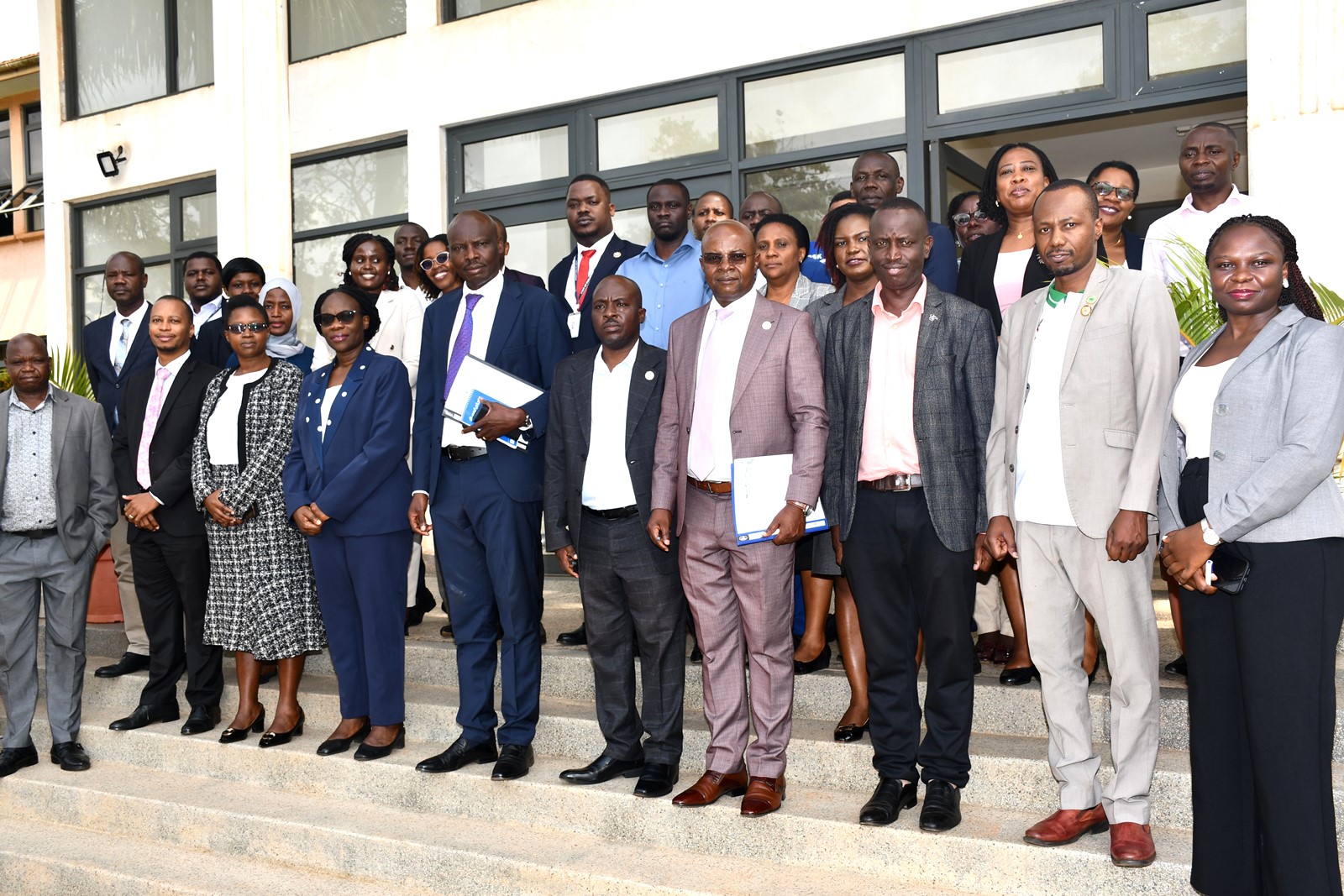
By Wilber Tumutegyereize
In a significant step toward strengthening fiscal governance and enhancing evidence-based decision-making, the Parliament of Uganda, in collaboration with the Ministry of Finance, Planning and Economic Development and Makerere University, has launched a five-day intensive training programme on Integrated Macroeconomic Modelling.
The training brings together staff of the Parliamentary Budget Office (PBO) for a comprehensive capacity-building programme designed to deepen their analytical expertise in assessing national budgets, evaluating fiscal policy options, and generating independent, data-driven advice for Members of Parliament. The initiative forms part of a broader institutional strategy to reinforce Parliament’s oversight role and ensure that national budgeting processes are aligned with Uganda’s development priorities as articulated in the National Development Plan and Parliament’s Strategic Plan.
Strengthening Evidence-Based Fiscal Oversight
Speaking at the opening session on behalf of the Manager of the Public Investment Management (PIM) Centre of Excellence at Makerere University, Dr. Peter Babyenda emphasized that the increasing complexity of Uganda’s fiscal environment demands stronger analytical capacity within Parliament.
“This training comes at a critical time when the demands on Parliament to undertake rigorous scrutiny of fiscal and economic policy have never been greater,” Dr. Babyenda stated.
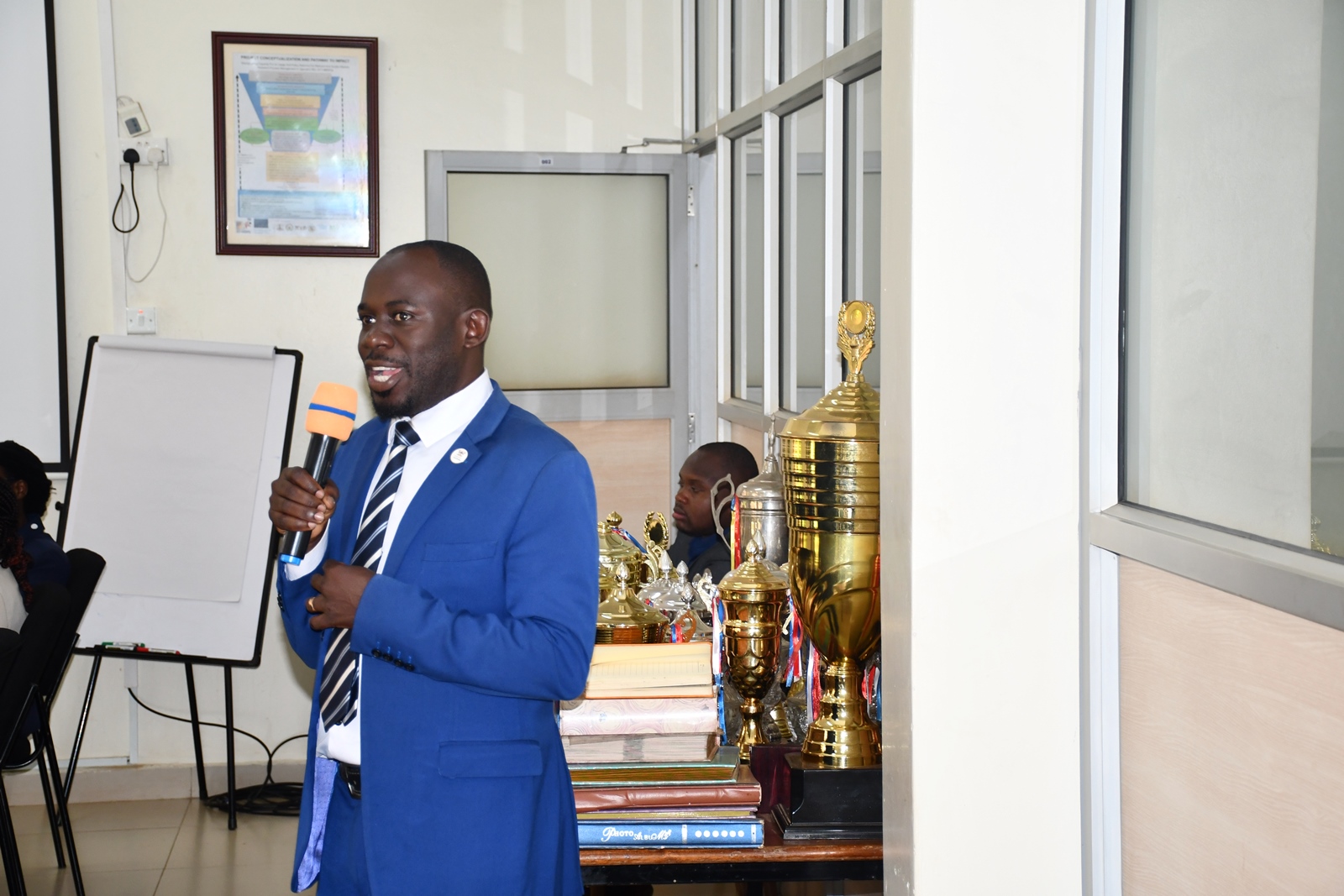
He noted that Parliament’s constitutional mandate—to legislate, appropriate public funds, and oversee government expenditure—requires objective, independent, and technically sound economic analysis. The Parliamentary Budget Office plays a central role in fulfilling this mandate by providing Members of Parliament with timely assessments of revenue projections, expenditure allocations, public debt sustainability, and macroeconomic trends.
Dr. Babyenda explained that the Government’s Integrated Macroeconomic Model provides a holistic framework for understanding the interconnections between economic growth, fiscal policy, public investment, inflation, debt dynamics, and household welfare. By incorporating this model into parliamentary analysis, the PBO will be better positioned to simulate alternative policy scenarios and assess their short- and long-term implications.
Institutional Priorities
Mr. Henry Waiswa, Deputy Clerk to Parliament in charge of Corporate Affairs, contextualized the training within Parliament’s broader institutional reform agenda. He underscored Parliament’s constitutional responsibility to legislate, allocate resources, and oversee the management of public finances.
“Since its establishment under the Budget Act and its anchoring under the Administration of Parliament Act, the Parliamentary Budget Office has become a cornerstone of evidence-based fiscal oversight,” Mr. Waiswa noted.
He observed that Uganda’s public financial management landscape has become increasingly complex, with evolving fiscal pressures, development financing needs, and global economic uncertainties. In such an environment, Parliament must not only examine headline budget figures but also anticipate the macroeconomic and distributional effects of policy decisions on households, businesses, and vulnerable communities.
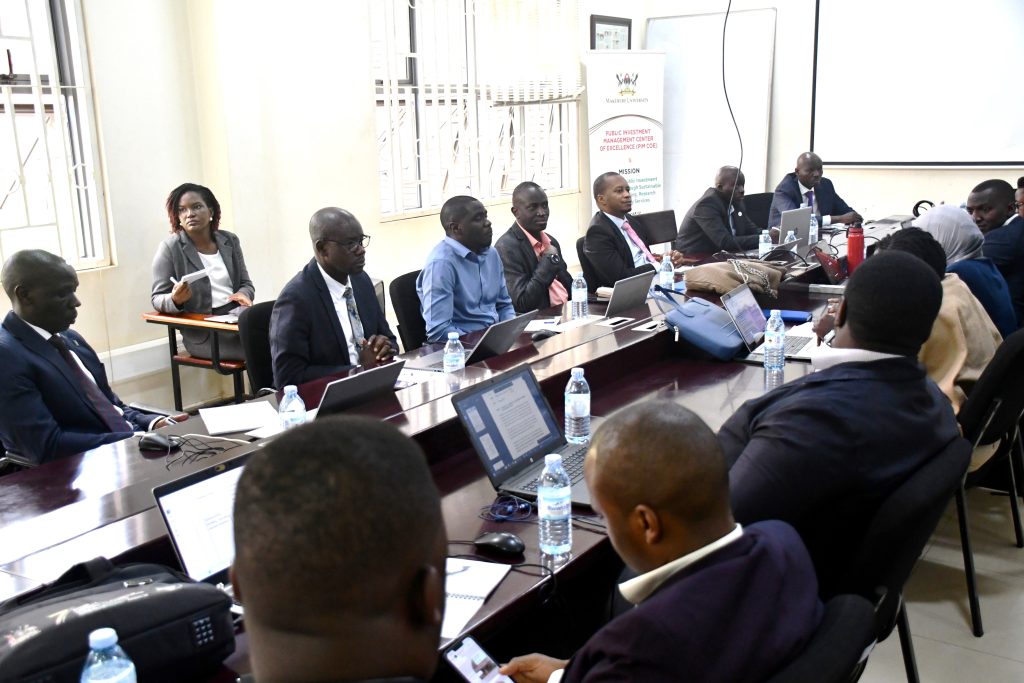
Mr. Waiswa further expressed appreciation to the Ministry of Finance, Makerere University, and the Resource Enhancement and Accountability Programme (REAP) for their technical and financial support in designing and facilitating the training.
Academic Expertise and Analytical Rigor
Professor Edward Bbaale, Director of the PIM Centre of Excellence at Makerere University, highlighted the critical role of academia in strengthening public sector institutions. He emphasized that collaboration between Parliament, the Ministry of Finance, and Makerere University reflects a shared commitment to improving the quality of fiscal governance.
“When our key public institutions work together, we enhance the credibility of economic management and ensure that policy decisions are informed by rigorous analysis,” Professor Bbaale said.
He explained that Integrated Macroeconomic Models combine key economic indicators, such as Gross Domestic Product (GDP), government revenue and expenditure, inflation, debt, investment, and external balances, into a unified analytical framework. These models enable analysts to conduct “what-if” simulations, test policy assumptions, and evaluate trade-offs between competing fiscal priorities.
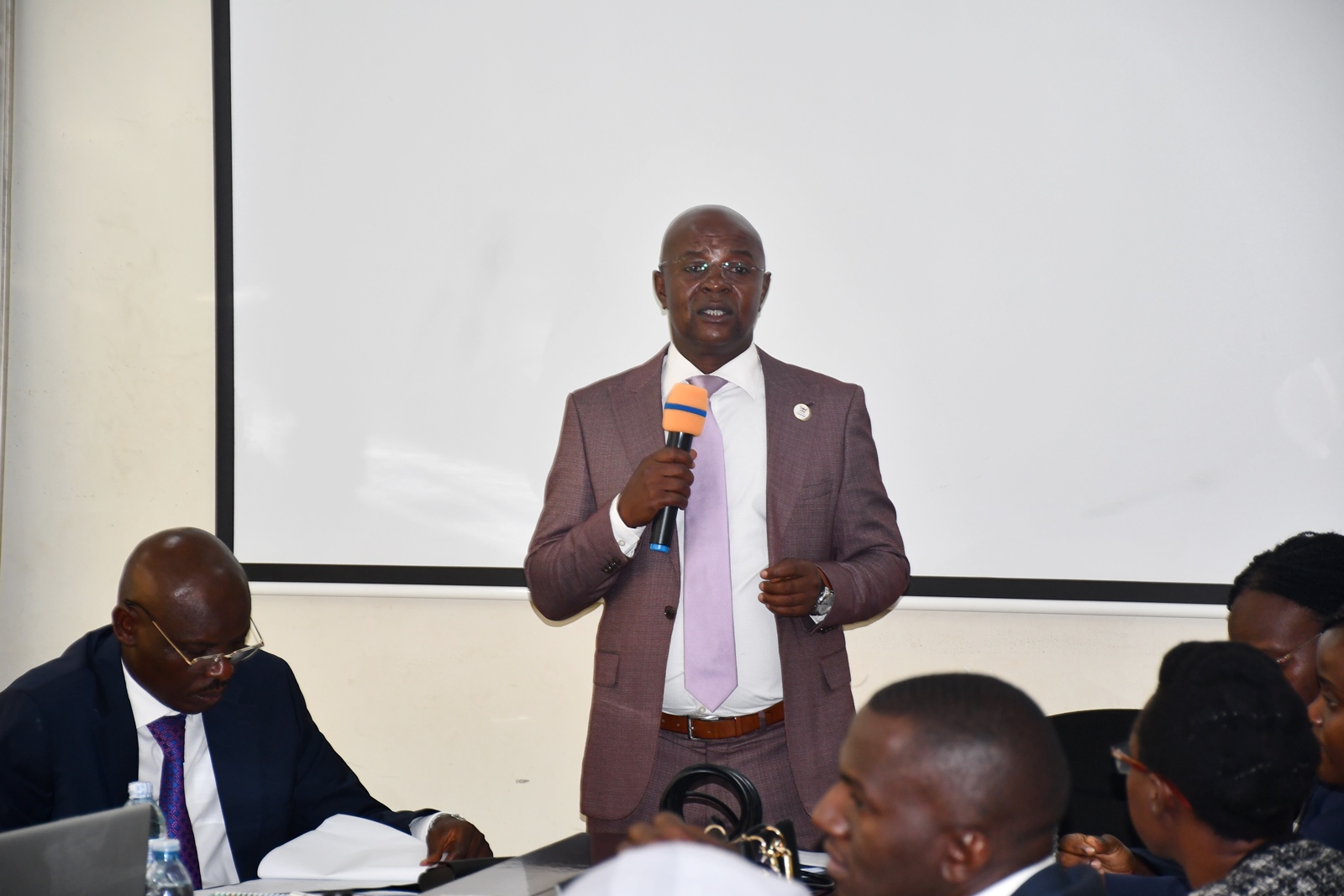
Professor Bbaale urged participants to fully utilize the five-day training to strengthen their technical proficiency and contribute meaningfully to Parliament’s oversight function.
Practical Application and Long-Term Impact
The training programme emphasizes hands-on learning, allowing participants to work directly with the Integrated Macroeconomic Model. Through practical exercises, PBO staff will learn how to:
- Simulate alternative fiscal and macroeconomic scenarios.
- Assess revenue and expenditure implications of policy proposals.
- Evaluate public debt sustainability and fiscal risks.
- Examine distributional impacts on poverty, inequality, and household welfare.
- Develop evidence-based policy briefs for Members of Parliament.
Dr. Babyenda reiterated that the value of the training lies in its practical application.
“The ultimate measure of success will be how effectively participants apply these tools to real parliamentary analysis,” he said. “It is through this application that Parliament can maintain rigorous oversight over public finances.”
A Strategic Investment in Institutional Capacity
By institutionalizing the use of Integrated Macroeconomic Modelling within the Parliamentary Budget Office, Uganda is making a strategic investment in sustainable institutional capacity. The initiative ensures that parliamentary analysts are trained using the same analytical frameworks applied in national fiscal planning, thereby reinforcing both technical quality and independence in budget scrutiny.
As Uganda navigates evolving economic challenges, the strengthened capacity of the PBO will enable Parliament to critically evaluate budget proposals, anticipate policy outcomes, and provide informed, transparent, and accountable oversight of public resources.
The five-day Integrated Macroeconomic Modelling training thus represents a pivotal milestone in advancing Uganda’s commitment to sound fiscal management, democratic governance, and evidence-based policymaking.
Business & Management
Climate variability found to shape malaria trends in Yumbe District
Published
1 week agoon
February 20, 2026
A new study led by scientists from Makerere University School of Public Health has demonstrated that short-term climate variability plays a significant role in malaria transmission in Yumbe District, West Nile sub-region of Uganda. The study, Climate variability and malaria incidence trends in Yumbe District, West Nile Sub-region of Uganda (2017–2021), by Lesley Rose Ninsiima, Rogers Musiitwa, Zaitune Nanyunja, James Muleme, Chris Maasaba, Twahiri Anule, and David Musoke, was published in February 2026 in Malaria Journal through Springer Nature Link.
Today, malaria remains a major public health burden in Uganda, where environmental conditions support sustained transmission. Despite persistent outbreaks in northern Uganda, limited local evidence exists on how the changing climate patterns influence malaria trends. This study addressed that gap by examining five years of malaria surveillance data alongside district-level rainfall and temperature records.

Using routine health facility reports from the District Health Information System (DHIS) and climate data from the Uganda National Meteorological Authority (UNMA), the researchers applied time-series analysis to assess seasonal patterns and delayed climate effects on malaria incidence. Between 2017 and 2021, Yumbe District recorded 2,066,711 malaria cases, with transmission showing clear seasonal peaks between May and July and September and November, aligning with rainy periods.
Their analysis showed that rainfall was the strongest climatic driver of malaria transmission. Increased rainfall was associated with higher malaria cases approximately one month later, reflecting the time needed for mosquito breeding and transmission cycles. In contrast, higher minimum temperatures were linked to reduced malaria incidence, while maximum temperature showed no significant effect. Together, rainfall and minimum temperature explained a substantial proportion of variation in malaria cases, highlighting malaria’s sensitivity to short-term climate fluctuations.
The study findings underscore the value of integrating climate information into malaria surveillance and early warning systems to anticipate transmission peaks and guide timely interventions. Strengthening collaboration between public health and meteorological sectors, the researchers argue, could improve preparedness and support climate-informed malaria control strategies in high-burden settings.
Further details: https://link.springer.com/article/10.1186/s12936-026-05824-0
Trending
-

 Humanities & Social Sciences5 days ago
Humanities & Social Sciences5 days agoMeet Najjuka Whitney, The Girl Who Missed Law and Found Her Voice
-

 Health1 week ago
Health1 week agoUganda has until 2030 to end Open Defecation as Ntaro’s PhD Examines Kabale’s Progress
-

 Agriculture & Environment1 week ago
Agriculture & Environment1 week agoUganda Martyrs Namugongo Students Turn Organic Waste into Soap in an Innovative School Project on Sustainable Waste Management
-

 General4 days ago
General4 days ago76th Graduation Highlights
-

 General1 week ago
General1 week agoMastercard Foundation Scholars embrace and honour their rich cultural diversity
